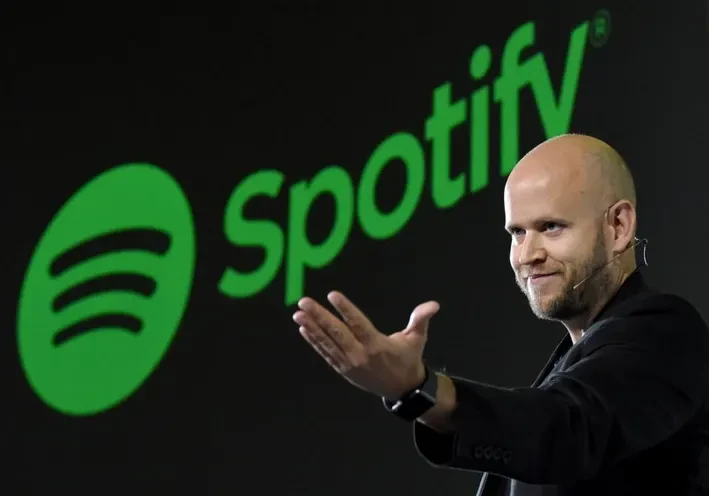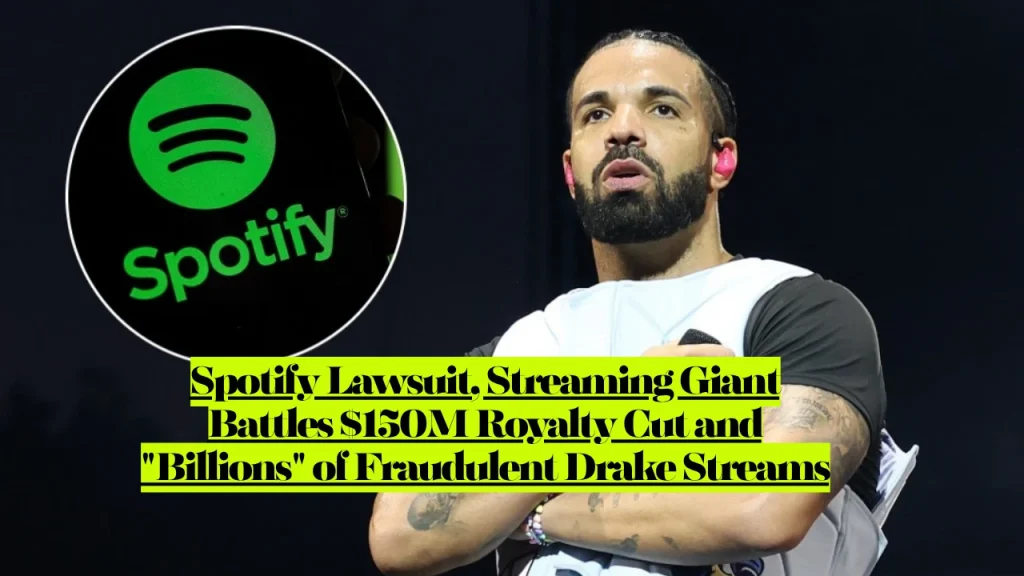Spotify Lawsuit, Streaming Giant Battles $150M Royalty Cut and “Billions” of Fraudulent Drake Streams
Spotify won a pivotal federal lawsuit in January 2025 when Judge Analisa Torres ruled the company could legally slash songwriter payments by reclassifying its Premium service as a bundle—potentially cutting royalties by $150 million annually. Days later, rapper RBX filed a class-action lawsuit claiming Spotify ignored “billions” of fraudulent Drake streams generated by bots between January 2022 and September 2025, seeking over $5 million in damages.
The bundling victory creates a blueprint for other streaming platforms like Apple and Amazon to reduce artist compensation, while the fraud lawsuit exposes systematic failures in Spotify’s anti-bot systems.
The MLC Bundling Lawsuit: Spotify’s $150M Victory
What Sparked the Royalty Dispute
In March 2024, Spotify reclassified its Premium subscription tiers as “bundles” after adding 15 hours of monthly audiobook access. Under a 2022 legal settlement called Phonorecords IV, bundle services in the United States are permitted to pay a lower mechanical royalty rate to publishers and songwriters than standalone music subscription services.
The Mechanical Licensing Collective filed a lawsuit in May 2024, accusing Spotify of unlawfully cutting its royalty payments nearly in half by bundling audiobooks with its premium subscription service.
The Court’s Ruling
In a decision issued January 29, 2025, Judge Analisa Torres ruled that Spotify’s approach was permitted under federal regulations, stating that audiobook streaming constitutes a distinct product with more than “token value”.
Judge Torres explained that “the Court finds that Section 115 and its implementing regulations are unambiguous, and that the only plausible application of the law supports Spotify’s position”. She wrote that “audiobook streaming is a product or service that is distinct from music streaming and has more than token value,” concluding that “Premium is, therefore, properly categorized as a Bundle”.
Torres dismissed the suit with prejudice, blocking the MLC from refiling with amendments.
Related article: Is the Death Penalty Legal in California? 2025 Status, Moratorium, and What It Means for Capital Cases

Financial Stakes
In a November financial filing, Spotify revealed that if the MLC were to win the lawsuit, the streaming service would have had to pay around €94 million (approximately $290 million) of additional royalties covering the period from the start of March 1, 2024 to September 30, 2024.
Spotify noted in its filing that if the MLC were to appeal and ultimately be entirely successful in its case, the additional royalties that would be due in relation to the period March 1, 2024 to June 30, 2025 would be approximately €256 million (about $290 million), plus potentially penalties and interest.
Industry Implications
The ruling opens the door for providers like Apple and Amazon to mimic Spotify’s royalty-slashing strategy. This ruling could significantly impact songwriter compensation in the streaming era and highlights a crucial gap in current copyright law: while record labels can negotiate directly with streaming services, songwriters and publishers remain bound by compulsory licensing rates.
All three major music publishers have now inked direct publishing agreements with Spotify that move beyond the traditional CRB model in the US, with Spotify signing an agreement with Sony Music Publishing that includes a new direct licensing arrangement.
MLC’s Response and Potential Appeal
The MLC issued a statement saying they “continue to be concerned that Spotify’s actions are not consistent with the law, and that today’s decision does not align with the facts and legal principles central to this action,” adding that they were “evaluating all available options, including our right to appeal”.
In September 2025, the MLC secured a procedural victory when Judge Torres allowed them to file an amended complaint with new claims. The case continues with fresh arguments.
The Drake Fraud Lawsuit: Billions in Fake Streams Alleged
The Explosive Claims
Filed in California District Court in November 2024, rapper RBX (Snoop Dogg’s cousin) claims that Spotify is “all too happy to turn a blind eye” to massive streaming fraud on its platform, with Drake in particular allegedly benefiting from billions of artificial streams.
The lawsuit alleges that “between January 2022 and September 2025, a substantial, non-trivial percentage of Drake’s ~37,000,000,000 streams on Spotify during that timeframe were inauthentic and appeared to be the work of a sprawling network of Bot Accounts”.
Drake is not named as a defendant—only Spotify faces legal action.
The Evidence of Bot Manipulation
The lawsuit claims an examination of Drake’s streams revealed “abnormal VPN usage” that obscured the location of bot accounts streaming Drake’s songs. Over a four-day period in 2024, at least 250,000 streams of his song “No Face” originated in Turkey “but were falsely geomapped through the coordinated use of VPNs to the United Kingdom in an attempt to obscure their origins”.
The suit further alleged that “less than 2% of his users accounts for roughly 15% of his overall streams, and roughly 9% of his streams are attributable to less than 1% of his users”. As a result, “Drake’s music accumulated far higher total streams compared to other highly-streamed artists, even though those artists had far more ‘users’ than Drake”.
The complaint highlights implausible listening patterns, including accounts that streamed Drake’s music for up to 23 hours a day, and geographic clusters in regions with “zero residential addresses”.

How the Fraud Hurts Other Artists
Spotify pays artists from a revenue pool and calculates royalty payments based on an artist’s share of the total number of monthly streams. An artist inflating their streams may take a bigger proportion of the pie than they are actually owed, leaving less payout for other artists.
The lawsuit claims that “the amount of streaming revenue that would otherwise have been distributed to legitimate Rights Holders but for the fraudulent boosting of Drake’s music is estimated to be in the hundreds of millions of dollars”.
Why Spotify Allegedly Tolerates Fraud
The lawsuit suggests that Spotify is particularly vulnerable to bots on the platform’s ad-supported free tier because myriad accounts can be generated without handing over a credit card number. By allegedly allowing bots to run rampant, Spotify can present high stream and user activity numbers to potential advertisers, the lawsuit alleges, stating “For Spotify, more users and music streams means more advertising dollars, so long as the true origin of the streams remains hidden”.
Spotify’s Defense
A Spotify representative said in a statement: “We cannot comment on pending litigation. However, Spotify in no way benefits from the industry-wide challenge of artificial streaming. We heavily invest in always-improving, best-in-class systems to combat it and safeguard artist payouts with strong protections like removing fake streams, withholding royalties, and charging penalties”.
The statement continues: “Our systems are working: In a case from last year, one bad actor was indicted for stealing $10,000,000 from streaming services, only $60,000 of which came from Spotify, proving how effective we are at limiting the impact of artificial streaming on our platform”.
The Ironic Timing
This legal action comes just weeks after a judge threw out Drake’s defamation lawsuit against Universal Music Group, which accused his own label of artificially boosting streams for Kendrick Lamar’s diss track “Not Like Us”.
Reports suggest that fake streams may account for as much as 10 percent of global plays, representing billions in lost royalties annually. Similar investigations are already underway in Turkey, Brazil, and Denmark, where bot-driven fraud has led to arrests.
Legal Implications and Damages Sought
The lawsuit is seeking damages in excess of $5 million, estimating that rights holders were defrauded of “hundreds of millions of dollars”. The filing requests that the case be certified as a class action, that Spotify be forced to name other potential victims, and that a jury trial be held to award damages.
RBX’s lawyer, Mark Pifko, stated: “When streams are artificially inflated on a large scale – as my client’s lawsuit alleges has happened with respect to streams of Drake’s music – it affects the income of countless songwriters, performers, and producers”.
Other Spotify Legal Battles
Beyond these two major cases, Spotify continues to face scrutiny over its business practices. The company recently implemented a policy against artists using paid third-party services that guarantee streams, which could result in their music being removed from the platform.
What This Means for Artists and the Industry
The bundling lawsuit establishes that streaming services can reduce payments to songwriters through creative product packaging. Songwriters already feel like they’re getting a raw deal with the current licensing setup—they’ve argued the framework gives them no power to refuse a streaming service from using their song (unlike recording artists and record labels) and locks them into statutory rates approved by the Copyright Royalty Board.
The fraud lawsuit exposes systematic vulnerabilities in how streaming platforms police artificial streams, potentially affecting legitimate artists’ royalty payments across the industry.
Frequently Asked Questions
What is the Spotify lawsuit about?
Spotify faces two major lawsuits in 2025: a royalty bundling dispute and a fraud claim involving Drake streams. In January, Spotify won a lawsuit from the Mechanical Licensing Collective over its decision to reclassify Premium subscriptions as “bundles” and pay lower royalty rates. Separately, rapper RBX filed a class-action lawsuit claiming Spotify ignored billions of fraudulent Drake streams generated by bots.
How much money is at stake in the Spotify bundling lawsuit?
If Spotify had lost the bundling case, it would have owed approximately €256 million (about $290 million) in additional royalties for the period from March 1, 2024 to June 30, 2025, plus potentially penalties and interest. Billboard estimated that Spotify’s “bundle” would result in the company paying roughly $150 million less per year.
Did Drake do anything wrong in the fraud lawsuit?
The lawsuit does not allege that Drake did anything criminal. Only Spotify is named as a defendant. Drake is cited only as the alleged beneficiary of the fraudulent streaming activity.
Can Spotify’s bundling win be appealed?
The MLC stated they are “evaluating all available options, including our right to appeal”. However, in September 2025, the court allowed the MLC to file an amended complaint with new claims, meaning the case continues with fresh arguments.
How does streaming fraud affect other artists?
Spotify pays artists from a revenue pool based on an artist’s share of total monthly streams. An artist inflating their streams takes a bigger proportion of the pie than actually owed, leaving less payout for other artists. The lawsuit estimates this fraud cost legitimate rights holders “hundreds of millions of dollars”.
What evidence supports the Drake fraud claims?
The lawsuit cites “abnormal VPN usage” to obscure bot locations, including 250,000 streams of “No Face” that originated in Turkey but were falsely mapped to the UK over four days in 2024. The suit also claims less than 2% of Drake’s users account for roughly 15% of his overall streams.
Will other streaming services follow Spotify’s bundling strategy?
The ruling opens the door for providers like Apple and Amazon to mimic Spotify’s royalty-slashing strategy. However, some legal experts suggest other services may be hesitant due to the risk that an appeal could overturn the decision and create ill will with artists and publishers.
Related Articles
Learn more about music industry legal issues:
- How Much Does an Employment Lawyer Cost – Understanding legal fee structures
- Walmart vs Capital One Lawsuit – Major corporate legal disputes
- What Are the Importance of Business Law – Business legal fundamentals
Disclaimer: This information is for educational purposes only and does not constitute legal advice. Consult an attorney specializing in music law or entertainment litigation for specific legal guidance regarding streaming royalties, copyright disputes, or music industry contracts.
About the Author

Sarah Klein, JD, is a licensed attorney and legal content strategist with over 12 years of experience across civil, criminal, family, and regulatory law. At All About Lawyer, she covers a wide range of legal topics — from high-profile lawsuits and courtroom stories to state traffic laws and everyday legal questions — all with a focus on accuracy, clarity, and public understanding.
Her writing blends real legal insight with plain-English explanations, helping readers stay informed and legally aware.
Read more about Sarah
